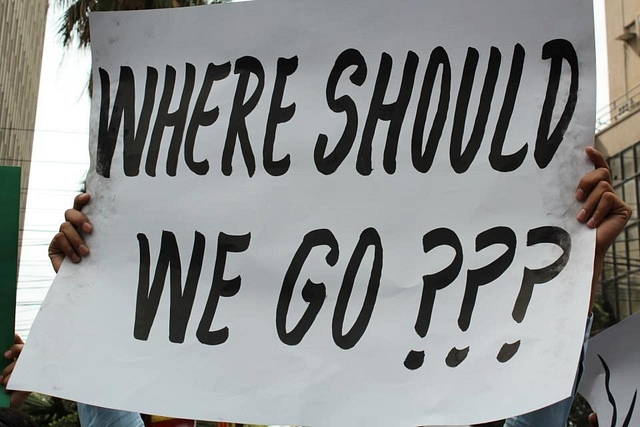
India Must Be A Formal Homeland For Hindus Rather Than A Hindu Rashtra
Baldev Kumar’s plight, and those of all minorities in our neighbourhood, suggests that India needs to mark itself out as the ultimate homeland for Hindus, rather than talking of a Hindu rashtra, which gives rise to fears of a theocratic state.
Even as we tie ourselves into knots over the question of giving easy citizenship rights to Hindu victims of persecution in our Muslim-majority neighbouring countries (i.e., Pakistan, Bangladesh and Afghanistan), the case of a former legislator from Imran Khan’s own party, Pakistan Tehreek-e-Insaf (PTI), who is seeking asylum in India, should concentrate minds.
Baldev Kumar, a 43-year-old Sikh, his wife and two children came to India last month and have sought asylum in India due to the Pakistani state’s persecution of minorities. He told newspersons: “I have come here to seek asylum and will request (Prime Minister Narendra) Modi Sahib to help us.”
Kumar joined Imran’s party in the belief that it would change Pakistan to something better, but that hasn’t happened. He pointed to the abduction of a teenage Sikh girl --- the daughter of a Gurdwara granthi --- and her marriage to a Muslim after conversion, as evidence of what minorities have to go through in Pakistan.
His plight, and those of all minorities in our neighbourhood, suggests that India needs to mark itself out as the ultimate homeland for Hindus, rather than talking of a Hindu rashtra, which gives rise to fears of a theocratic state.
Babasaheb Ambedkar, who foresaw such a situation when he wrote his famous tract on Pakistan before partition, was very clear that the transfer of minority populations was not only necessary, but also feasible.
He suspected that minority Hindus in Pakistan were probably less safe than minority Muslims in India, and that is exactly what has played out over the last few decades.
After discussing the issue of demarcating the boundaries of Pakistan and India, Ambedkar addressed the problem of minorities in both countries thus. He wrote:
There are two methods of protecting their interests. First is to provide safeguards in the constitution for the protection of the political and cultural rights of the minorities. To Indians this is a familiar matter and it is unnecessary to enlarge upon it.
Second is to provide for their transfer from Pakistan to Hindustan. Many people prefer this solution and would be ready and willing to consent to Pakistan if it can be shown that an exchange of population is possible. But they regard this as a staggering and a baffling problem. This no doubt is the sign of a panic-stricken mind. If the matter is considered in a cool and calm temper, it will be found that the problem is neither staggering nor baffling.
These statements imply that the problem of protecting minorities was likely to be bigger in Pakistan than in India.
But he did go wrong on one issue. He underestimated the scale of the problem for Hindus choosing to remain in Pakistan.
He thought an exchange of minority populations would be easy since the bulk of them would choose to stay put, while the partitions of Bengal and Punjab would anyway remove the need for a major exchange of minority populations.
To begin with, consider the dimensions of the problem. On what scale is this transfer going to be? In determining the scale one is bound to take into account three considerations. In the first place, if the boundaries of the Punjab and Bengal are redrawn, there will be no question of transfer of population so far as these two provinces are concerned.
In the second place, the Musalmans residing in Hindustan do not propose to migrate to Pakistan, nor does the League want their transfer. In the third place, the Hindus in the North-West Frontier Province, Sind and Baluchistan do not want to migrate. If these assumptions are correct, the problem of transfer of population is far from being a staggering problem. Indeed, it is so small that there is no need to regard it as a problem at all.
Clearly, Ambedkar was wrong in presuming that Hindus in East Bengal, the North-West Frontier Province, Sind and Baluchistan will be safe in those places, when history has proved otherwise. He was also wrong to presume that the transfer of populations in Punjab would be smooth. It turned out to be the bloodiest of them all.
In the east, the exodus of Hindus from Bangladesh has never stopped since 1947, and the trickle from Pakistan is relatively small only because the borders are less porous in the west than with Bangladesh.
The arrival of Baldev Kumar seeking asylum, and hundreds of other Pakistani Hindus who now live in camps in Rajasthan and Delhi, tells us two things:
One, Hindus will, if given half a chance, move out of Pakistan and Bangladesh if the state facilitated it.
Two, the Muslims of India show no signs of wanting to migrate to a Muslim-majority country, either Pakistan of Bangladesh.
The one-sided ethnic cleansing of Hindus from two neighbouring Muslim-majority states is a fact --- and will become a complete reality sooner than later. It is almost over in Pakistan, and in Bangladesh this could happen over the next three decades.
India cannot any longer pretend to be neutral about which religious groups it must help out. It is the persecuted Hindus, Sikhs, Jains and Buddhists of Indic origin. This must be hard-coded into our constitution as a special duty of a Hindu-majority state, and not merely left to devices like the Citizenship Amendment Bill.
India needs to become the ultimate homeland for persecuted Hindus, Sikhs, Jains and Buddhists of Indic origin (meaning, it can exclude Buddhists from existing Buddhist majority countries like Myanmar, Sri Lanka, Thailand, etc.). We need to become a Hindu Homeland rather than a Hindu Rashtra.